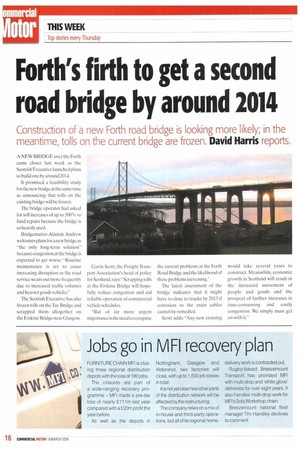Forth's firth to get a second
Page 16

If you've noticed an error in this article please click here to report it so we can fix it.
road bridge by around 2014
Construction of a new Forth road bridge is looking more likely; in the meantime, tolls on the current bridge are frozen. David Harris reports.
A NEW BRIDGE over the Forth came closer last week as the Scottish Executive launched plans to build one by around 2014.
It promised a feasibility study for the new bridge at the same time as announcing that tolls on the existing bridge will be frozen.
The bridge operator had asked for toll increases of up to 500% to fund repairs because the bridge is so heavily used.
Bridgemaster Alastair Andrew welcomes plans for a new bridge as "the only long-term solution" because congestion at the bridge is expected to get worse: "Routine maintenance is set to cause increasing disruption as the road service wears out more frequently due to increased traffic volumes and heavier goods vehicles."
• The Scottish Executive has also frozen tolls on the Tay Bridge and scrapped them altogether on the Erskine Bridge near Glasgow. Gavin Scott, the Freight Transport Association's head of policy for Scotland,says: "Scrapping tolls at the Erskine Bridge will hopefully reduce congestion and aid reliable operation of commercial vehicle schedules.
"But of far more urgent importance isthe need torecognise the current problems at the Forth Road Bridge and the likelihood of these problems increasing."
The latest assessment of the bridge indicates that it might have to close to trucks by 2013 if corrosion to the main cables cannot be remedied.
Scott adds: "Any new crossing would take several years to construct. Meanwhile, economic growth in Scotland will result in the increased movement of people and goods and the prospect of further increases in time-consuming and costly congestion. We simply must get on with it."
































































































































































































